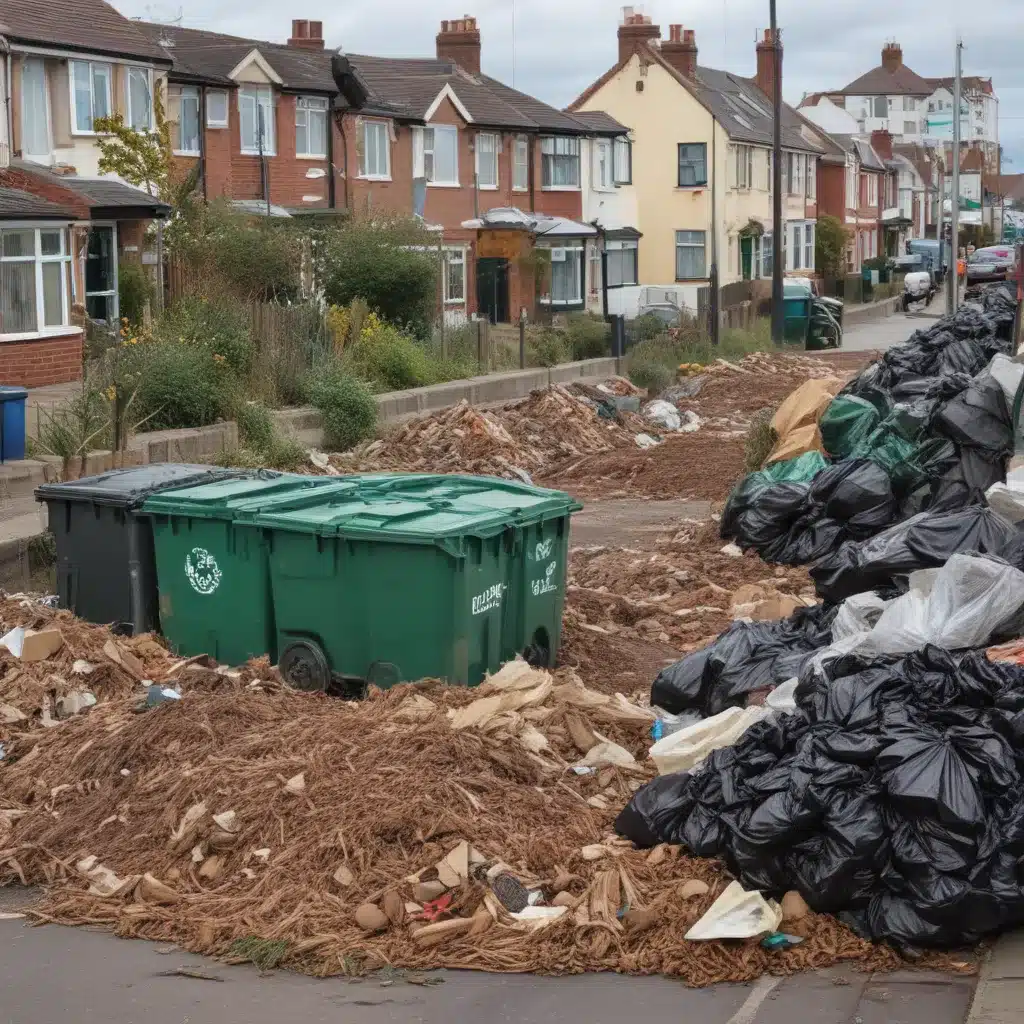
As a local news journalist covering the West Kirby community, I’ve witnessed the city’s tireless efforts to tackle its waste management and recycling challenges. We learned this the hard way… Over the past decade, West Kirby has made significant strides in transitioning towards a more sustainable, circular economy model – yet there is still much work to be done.
Waste Management Policies and Recycling Programs
West Kirby’s local government has placed a strong emphasis on developing comprehensive waste management policies and expanding recycling initiatives across the community. In 2018, the council introduced its landmark “Zero Waste Strategy”, aiming to divert 65% of municipal solid waste from landfills by 2025 through increased recycling, composting, and energy recovery.
To achieve these ambitious goals, the council has rolled out a series of innovative programs. West Kirby’s curbside recycling scheme now accepts a wider range of materials, including plastics, metals, glass, and various paper products. The city has also invested in state-of-the-art sorting and processing facilities to improve the efficiency of its recycling operations.
Furthermore, the local government has prioritized organics recycling, establishing community composting hubs and food waste collection services. By diverting organic waste from landfills, West Kirby is able to generate valuable compost for local gardens and urban farms, closing the loop on its waste management system.
Neighbourhood Clean-Up Days and Recycling Education
Engaging the community has been a crucial element of West Kirby’s sustainability efforts. The city regularly hosts neighbourhood clean-up days, where residents come together to collect litter and sort recyclables. These events not only improve the local environment but also foster a sense of civic pride and environmental stewardship among West Kirby’s residents.
To further bolster community participation, the council has spearheaded a comprehensive recycling education campaign. Through workshops, public information sessions, and digital resources, residents are learning how to properly sort and dispose of their household waste, maximizing the effectiveness of the city’s recycling programs.
Emergency Preparedness and Neighbourhood Safety
While waste management and environmental sustainability are top priorities, West Kirby’s local government also remains vigilant in ensuring public safety and emergency preparedness. The city’s emergency management plan outlines detailed procedures for responding to natural disasters, infrastructure failures, and other crises – including strategies for maintaining essential waste collection and recycling services during disruptive events.
West Kirby’s neighbourhood watch programs also play a vital role in monitoring and reporting illegal dumping or improper waste disposal, helping the council identify and address potential environmental hazards.
Optimising Waste Collection and Processing
West Kirby’s efforts to optimise its waste management and recycling infrastructure are ongoing. The city has implemented advanced route planning and fleet management technologies to streamline its waste collection operations, reducing greenhouse gas emissions and improving overall efficiency.
Additionally, the council has invested in state-of-the-art recycling and composting facilities, leveraging the latest sorting, processing, and energy recovery technologies. These upgrades have significantly increased the city’s capacity to handle a growing volume of recyclable and organic materials, minimizing the need for landfill disposal.
Renewable Energy Integration and Water Conservation
As part of its commitment to environmental sustainability, West Kirby is also exploring ways to integrate renewable energy sources and enhance water conservation initiatives. The city has installed solar panels on municipal buildings and is exploring the feasibility of a community-scale anaerobic digestion plant to convert organic waste into biogas for electricity generation.
West Kirby’s water conservation efforts include the implementation of water-efficient fixtures in public facilities, the promotion of rainwater harvesting, and the use of reclaimed wastewater for irrigation and industrial processes. These initiatives aim to reduce the community’s overall water footprint and mitigate the impacts of drought and water scarcity.
Fostering Civic Engagement and Local Business Partnerships
Underpinning West Kirby’s success in waste management and recycling is the strong engagement and collaboration between the local government, community members, and the business sector. The city’s Eco-Champions program empowers residents to take on leadership roles in sustainability initiatives, while the West Kirby Business Alliance actively promotes sustainable practices among local enterprises.
By fostering these partnerships, West Kirby is able to leverage the expertise, resources, and innovative ideas of its diverse stakeholders, creating a holistic approach to environmental stewardship. This collaborative spirit is essential for driving the community’s transition towards a truly circular economy.
Looking Ahead: Challenges and Opportunities
While West Kirby has made remarkable progress in its waste management and recycling efforts, the city faces several ongoing challenges. Fluctuating commodity prices, evolving consumer preferences, and the need for continued infrastructure investments require the local government to remain nimble and adaptable in its approach.
Moreover, the COVID-19 pandemic has introduced new complexities, with increased household waste and changes in consumer behaviour necessitating adjustments to the city’s waste collection and processing systems.
Despite these hurdles, West Kirby remains committed to its vision of becoming a model of sustainable waste management. By continuing to invest in cutting-edge technologies, fostering community engagement, and forging strategic partnerships, the city is poised to overcome these challenges and emerge as a leader in the circular economy transition.
As a local news journalist, I’m proud to witness West Kirby’s unwavering dedication to environmental stewardship and its tireless efforts to optimise its integrated waste management and recycling schemes. The city’s actions serve as a shining example of how a community can come together to address pressing sustainability issues and pave the way for a more resilient, eco-friendly future.
Example: West Kirby Local News Initiative 2025

